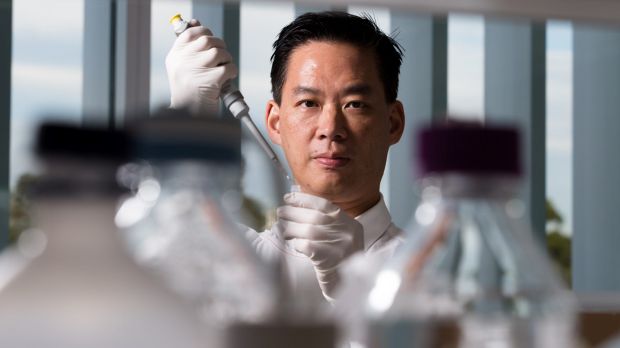September 13, 2019 Print
Predictive test’s potential for improving sepsis outcomes.
Our understanding of sepsis is limited, yet sepsis is one of the most common conditions in patients admitted to intensive care. Globally, there is a death from sepsis every three and a half seconds.
Today is World Sepsis Day (13 September 2019), an opportunity for people to raise awareness about the condition, and to join the fight against it.
Talking about sepsis is an important first step in raising public awareness, so we spoke to WIMR researcher and intensive care specialist Associate Professor Benjamin Tang to discuss why research is vital for combatting sepsis.
 Associate Professor Benjamin Tang and his team are researching a potential test for sepsis.
Associate Professor Benjamin Tang and his team are researching a potential test for sepsis.
Sepsis is a term used to describe a severe reaction to an infection. When the immune system fails to control a bacteria or virus, it can go into ‘overdrive’ and attack the body, including major organs such as the kidney, lungs and heart.
Associate Professor Tang said, “The prognosis for sepsis is, unfortunately, extremely poor, and the rate of fatality is high – somewhere between 20 and 40 per cent.”
It can affect people of all ages, however, older patients, and those with compromised immune systems such as people receiving chemotherapy are more likely to die from the condition.
As an intensive care specialist, Associate Professor Tang sees many patients affected by sepsis.
“It’s much more common than one might realise – approximately 27 to 30 million people develop sepsis every year,” he said.
“It’s easy for doctors to recognise the signs of infection, but it’s much harder to recognise when it progresses from an infection to sepsis. The classic symptoms of sepsis – fever, low blood pressure, a rapid heartbeat, and shallow breathing – are also present in other illnesses. This overlap can cause diagnostic uncertainty, and in some cases, can lead to a delay in appropriate treatment.”
Associate Professor Tang and his research group at The Westmead Institute for Medical Research (WIMR) are hoping to uncover one of the biggest mysteries about sepsis – why it occurs.
“We are investigating why simple, uncomplicated infections ‘break through’ the immune system and progress to highly lethal sepsis. This question is critical, as we need to understand why sepsis occurs in order to prevent it.
“We hope to develop new therapeutic targets and, hopefully, new or better therapies to reduce global mortality rates from sepsis.”
Associate Professor Tang’s team are also working on a potential test for sepsis. WIMR researchers are investigating biomarkers that could predict the likelihood of sepsis in the hope that, one day, a simple blood test for sepsis could be available.
“There’s no way of knowing which patients will develop sepsis,” Associate Professor Tang said.
“If we are able to develop a predictive test, clinicians will be able to intervene much faster, preventing complications of sepsis, and improving clinical care for sepsis patients.”
For World Sepsis Day, Associate Professor Tang’s take-home message is that the condition needs to be taken seriously.
“Sepsis can kill. It’s important that people recognise the symptoms of sepsis, and understand how dangerous it can be.
“It’s clear that further research into sepsis is needed to tackle this global health threat.
“I’m glad that I’m contributing to that effort, both in my work as a clinician, and through research with my dedicated team.”
Associate Professor Benjamin Tang is affiliated with The Westmead Institute for Medical Research (WIMR), The University of Sydney and Nepean Hospital.